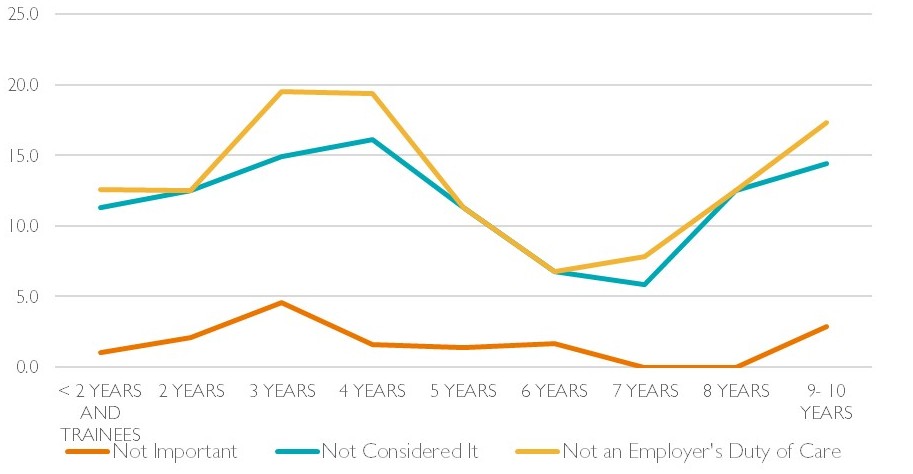Attitudes towards mental health in the legal workplace by PQE
Posted in Latest News on 14 Oct 2019

It is no surprise that legal professionals experience high levels of pressure throughout their working lives, especially at the beginning of their careers. As the stigma of mental health eases, law firms are showing unprecedented commitment in developing strategies around mental health and well-being to support their employees.
Earlier this year we surveyed over 3,000 legal professionals as part of our 2019 Salary and Benefits Benchmarker, however, we didn’t stop at remuneration and satisfaction with the perks on offer. We also polled our respondents about the importance of mental health, more specifically, how important they thought it was for an employer to provide mental health and well-being support as well as what factors had the biggest effect on mental health and well-being within the workplace.
We took a look at this information in Mental Health Awareness Week in May but felt it was important to return to the data in more detail following World Mental Health Day (10th October). This report gives insight into what different generations of lawyers think and feel about the subject of mental health within the sector.
Following a seismic shift in mental health awareness, generational differences in opinion on the topic have never been as significant. A recent report published on World Mental Health Day stated that 50% of millennials and 75% of members of Generation Z have voluntarily quit jobs due in part to mental health symptoms. It was also reported that less than 30% of respondents felt comfortable seeking support within the workplace and, over the past year, almost six in ten had “never” spoken with colleagues about their mental health.
Prospective junior lawyers and young legal professionals and are not only under pressure to prove themselves to their employers but are in fierce competition with their peers in securing opportunities. Research by the Junior Lawyers Division (JLD) from their resilience and well-being survey published earlier this year found that, of their 1,800 respondents, 48% had experienced mental ill-health in the last month, an increase of 26% on the previous year’s findings. More shockingly though, 1 in 15 of their respondents answered that they had had suicidal thoughts.
Our 2019 Salary and Benefits Benchmarker listed long hours, high pressure and tight deadlines as the three top factors impacting mental health within the legal working environment across all PQE and experience backgrounds. Interestingly, those in the < 2 years PQE and Trainee bracket also stated that relationships with colleagues, low pay, and corporate politics also had affected them.
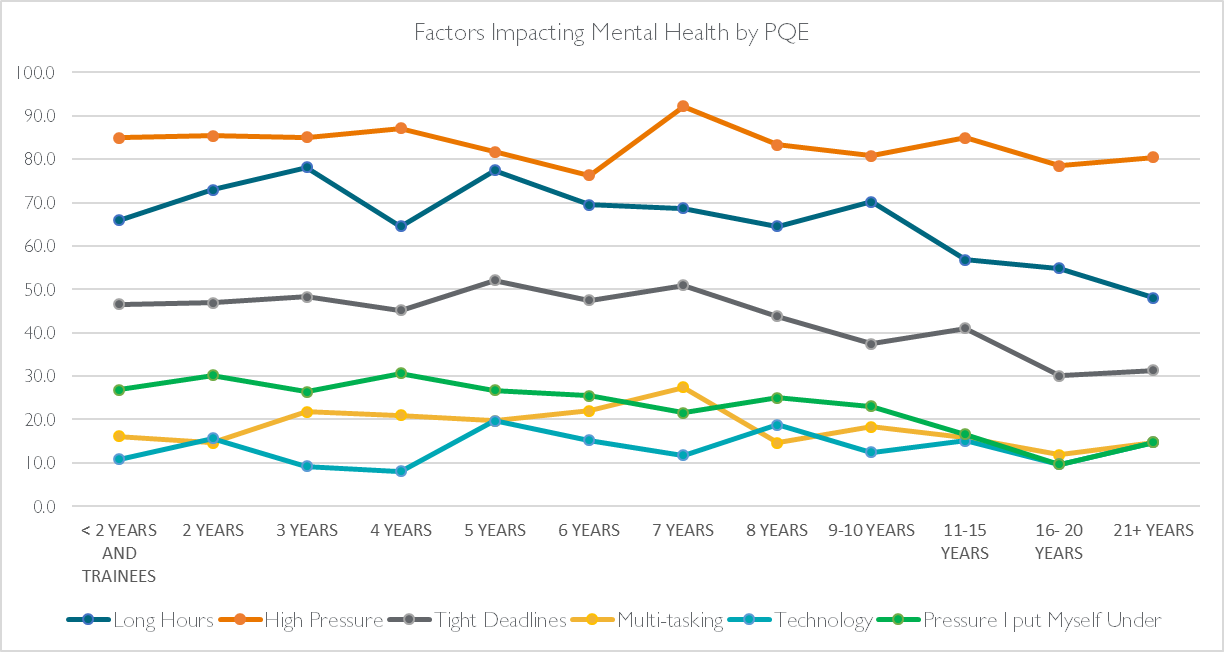
High pressure, the most commonly cited factor peaked at 7 years PQE, whereas long hours were documented as the highest reason at 3 years and 5 years PQE. Worries around tight deadlines and self-compounded pressure both appeared to fall gradually as the PQE level of our respondents increased.
In terms of support within the workplace, as predicted, the highest % of lawyers who felt it was “very important” that employers had provisions to aid the mental health of their workers were of the < 2 year PQE and trainee group. This then fell as experience increased. However, in combining the “very important” and “important” answers a different and more varied generational picture emerges. This sees the highest % of lawyers believing employer led mental health support to be important within the 6 years PQE group. A notable increase in the more apathetic and “not important” responses seemingly occurs between the 3-4 years PQE field which rises again after 8 years PQE.
Returning to young legal professionals, and drilling down further into location, though over 80% believed mental health and wellbeing support to be important nationally, there were slight regional differences in our < 2 years PQE and Trainee sample. Those based in the North East and Yorkshire followed by those in the South East and Eastern England were more likely to believe it important. The lowest % was within the South West, the area of the UK that was deemed by our general results (as released earlier this year) to be the happiest in their jobs nationally.
For more detail scroll below for data charts.
To view the full report from our 2019 Salary and Benefits Benchmarker click here. If you are considering a move, why not get in touch here or peruse our latest jobs here.
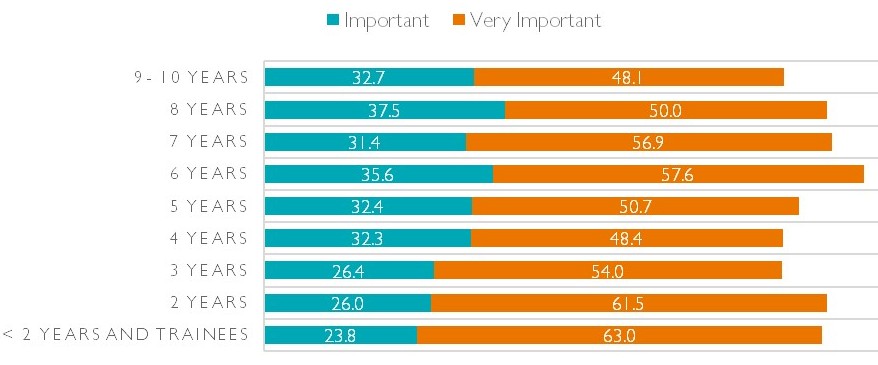
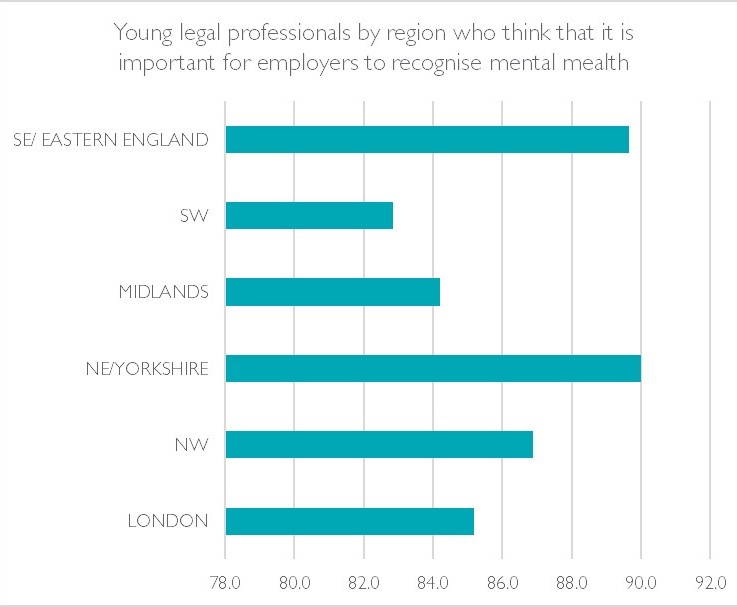
Expertise
We partner the HR professionals, practice managers, partners and business leaders who are accountable for hiring talent into their business.
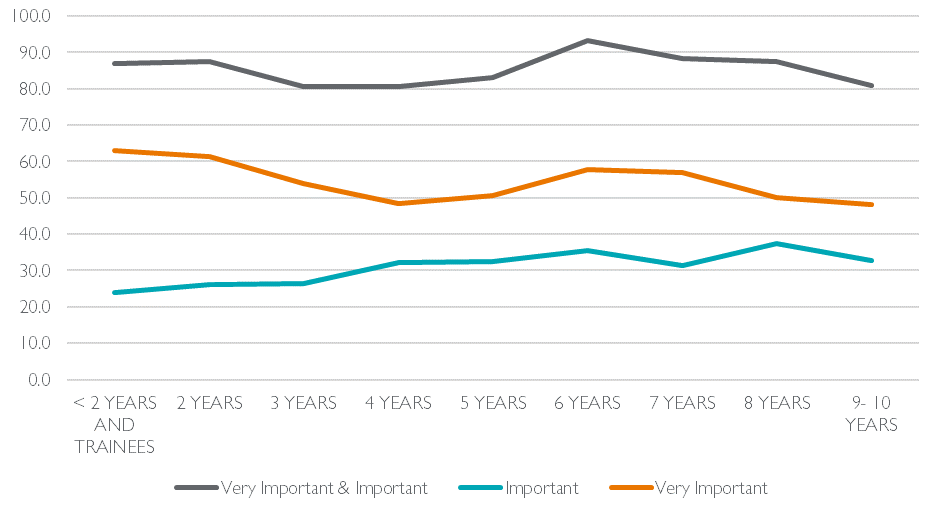
Supporting law firms, globally
Trusted by Legal 500, UK200, Top 100, Silver Circle, Magic Circle and US firms to deliver.
Latest insight
-
How popular really is hybrid working?
07 Apr 2025 -
What is the top priority for law firm leaders?
20 Jan 2025 -
How to make your 2025 Legal dreams come true!
13 Jan 2025 -
What poor mental health is costing firms...
13 Nov 2024 -
Beyond the surface: How law firms are quietly advancing social mobility
05 Nov 2024
